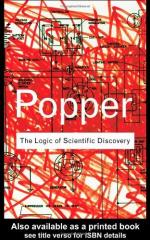
|
| Name: _________________________ | Period: ___________________ |
This test consists of 5 multiple choice questions, 5 short answer questions, and 10 short essay questions.
Multiple Choice Questions
1. What is one characteristic of the relationship between theory and classes of statements that must be present?
(a) Abstract.
(b) Tautological,
(c) Consistent.
(d) Auxiliary.
2. What method does Popper say applies to science and is important to the theory of knowledge?
(a) Proving theories.
(b) Learning assumptions.
(c) Understanding statements.
(d) Resolving contradictions.
3. What types of statements have no logical justification in which to draw conclusions?
(a) Circular.
(b) Singular.
(c) Logical.
(d) Inferential.
4. What does Popper think about statements in which individuals names do not occur?
(a) They are tautological.
(b) They are not logical.
(c) They are metaphysical.
(d) They are logical.
5. What is used to capture and explain the world?
(a) Logical statements.
(b) Scientific data.
(c) Laws of nature.
(d) Theories.
Short Answer Questions
1. What does Popper feel is a fruitless exercise?
2. What does Popper fear philosophers will think about methodological investigations?
3. What does the first rule of logic do?
4. Popper feels the principle of causality is not falsifiable and therefore regards it as what?
5. What type of approach do positivists use to investigate scientific statements?
Short Essay Questions
1. How does Popper define a scientist?
2. What must an experimenter do in order to test a theory?
3. Why does Popper discredit the conventionalist view of science?
4. With regard to universal and singular statements, what does Popper note about symbolic logic?
5. How does one make a statement falsifiable?
6. How do methodological rules differ from logical or deductive rules?
7. How is a naturalistic view constraining to scientific thought?
8. Why is the concept of numerical universality a problem for Popper?
9. What is Fries' trilemma?
10. What are the two conditions that must be met for a statement to be falsifiable?
|
This section contains 756 words (approx. 3 pages at 300 words per page) |

|




